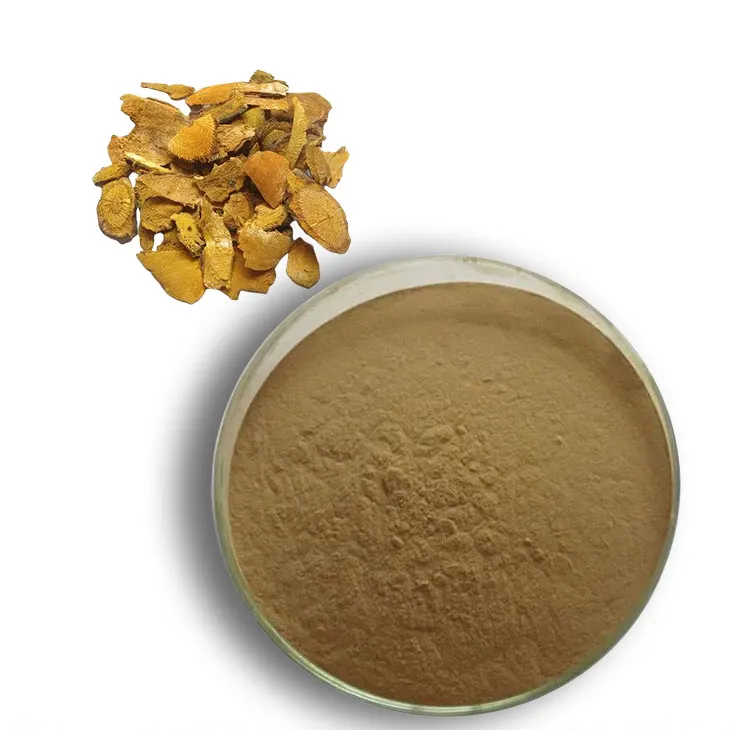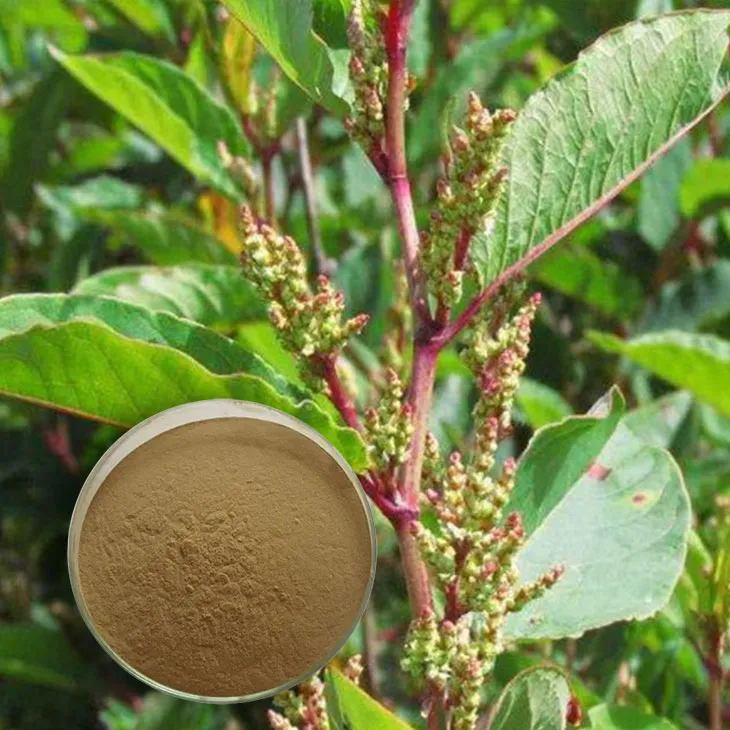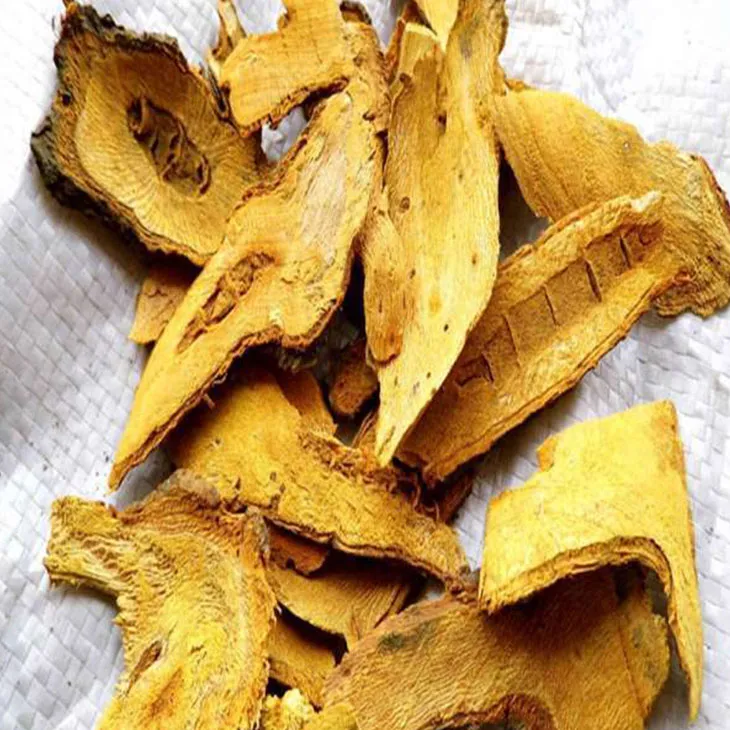- 0086-571-85302990
- sales@greenskybio.com
What is Polygonum cuspidatum extract? Definition, types, history and nutritional value.
2024-12-19

1. Definition of Polygonum Cuspidatum Extract
Polygonum Cuspidatum Extract is a substance derived from the Polygonum cuspidatum plant, also known as Japanese knotweed. This extract is obtained through different extraction methods, which are designed to isolate and concentrate the various bioactive components present in the plant. The plant itself is a perennial herbaceous species that is widely distributed in many regions, especially in Asia.

2. Types of Polygonum Cuspidatum Extract
2.1 Water - soluble Extract
The water - soluble extract of Polygonum cuspidatum contains a substantial amount of polysaccharides and some water - soluble active substances. Polysaccharides are complex carbohydrates that play important roles in biological processes. In the context of this extract, they contribute to its overall properties and potential health benefits. These water - soluble components can be obtained through processes such as aqueous extraction, where the plant material is soaked in water and then processed to separate the soluble components from the insoluble ones.
2.2 Alcohol - soluble Extract
The alcohol - soluble extract of Polygonum cuspidatum is rich in resveratrol and other phenolic compounds. Resveratrol has received significant attention in recent years due to its numerous potential health benefits. Phenolic compounds, in general, are known for their antioxidant properties. The alcohol - soluble extract is typically obtained by using alcohol - based solvents, such as ethanol, to extract these bioactive components from the plant. This method is effective in isolating resveratrol and other phenolic substances as they are more soluble in alcohol - based solvents compared to water.

3. History of Polygonum cuspidatum in Traditional Medicine
Polygonum cuspidatum has a long - standing history in Asian traditional medicine. For centuries, it has been used to treat a variety of ailments.
- Inflammation: In traditional medicine systems, it was believed that extracts from Polygonum cuspidatum could help reduce inflammation in the body. This was likely due to the presence of certain bioactive compounds that have anti - inflammatory properties. Inflammation is a natural response of the body to injury or infection, but chronic inflammation can lead to various health problems. The use of Polygonum cuspidatum in treating inflammation may have been based on empirical observations over time.
- Liver Problems: Another area where Polygonum cuspidatum has been traditionally used is in the treatment of liver problems. The liver is a vital organ responsible for many metabolic functions in the body. In traditional medicine, it was thought that the plant could help improve liver function, perhaps by helping to detoxify the liver or protect it from damage. However, the exact mechanisms by which it may have affected the liver were not fully understood at that time.
- Other Uses: Besides inflammation and liver problems, Polygonum cuspidatum was also used for other health - related issues in traditional medicine. For example, it may have been used to relieve pain, improve digestion, or enhance overall well - being. These uses were passed down through generations, and the plant became an important part of the traditional medicine pharmacopeia in many Asian cultures.

4. Nutritional Value of Polygonum cuspidatum Extract
4.1 Resveratrol and its Antioxidant Properties
One of the most notable components in the Polygonum cuspidatum extract is resveratrol. Resveratrol is a powerful antioxidant. Antioxidants are substances that can neutralize free radicals in the body. Free radicals are highly reactive molecules that can cause damage to cells, proteins, and DNA. By scavenging free radicals, resveratrol helps protect cells from oxidative damage, which is implicated in many chronic diseases, including cancer, heart disease, and neurodegenerative disorders.
Resveratrol's antioxidant activity also has potential anti - aging effects. Oxidative stress is considered one of the main factors contributing to the aging process. By reducing oxidative stress, resveratrol may help slow down the aging process at the cellular level. This could manifest as improvements in skin health, reduced wrinkles, and better overall physiological function in older age.
4.2 Role of Polysaccharides in Immunity
The polysaccharides present in the water - soluble extract of Polygonum cuspidatum play a crucial role in enhancing the body's immunity. The immune system is a complex network of cells, tissues, and molecules that defends the body against pathogens such as bacteria, viruses, and fungi. Polysaccharides can stimulate the immune system in various ways.
- They can activate immune cells such as macrophages, which are responsible for engulfing and destroying foreign invaders. By increasing the activity of macrophages, polysaccharides can enhance the body's first line of defense against infections.
- Polysaccharides may also help regulate the immune response, ensuring that it is neither too weak (resulting in susceptibility to infections) nor too strong (which can lead to autoimmune diseases). This balanced regulation of the immune system is important for maintaining overall health.
4.3 Other Potential Health Benefits
Besides resveratrol and polysaccharides, the Polygonum cuspidatum extract may contain other bioactive compounds that contribute to its overall nutritional value.
- Some phenolic compounds, in addition to resveratrol, may have anti - microbial properties, helping the body fight off infections caused by bacteria and fungi.
- There may also be compounds in the extract that can improve cardiovascular health, such as by reducing blood lipid levels or improving blood vessel function. However, more research is needed to fully understand these potential effects.
- It has been suggested that certain components of the extract could have anti - cancer properties. While this is an area of active research, preliminary studies have shown some promising results. For example, some compounds may be able to inhibit the growth of cancer cells or induce apoptosis (programmed cell death) in cancer cells. But again, further research is required to confirm these effects and to understand the underlying mechanisms.
5. Conclusion
Polygonum cuspidatum extract is a complex substance with a rich history in traditional medicine and significant potential in terms of nutritional value. The two main types of extracts, water - soluble and alcohol - soluble, each contain important bioactive components. Resveratrol in the alcohol - soluble extract offers antioxidant and potential anti - aging and disease - prevention benefits, while the polysaccharides in the water - soluble extract play a role in enhancing immunity. The historical uses of the plant in traditional medicine for treating inflammation and liver problems provide a basis for further scientific research into its medicinal properties. However, more studies are needed to fully understand the mechanisms of action of its components and to ensure its safety and effectiveness for various health applications. Overall, Polygonum cuspidatum extract represents an interesting area of research with the potential to contribute to the development of new natural health products.
FAQ:
1. How is Polygonum cuspidatum extract made?
Polygonum cuspidatum extract can be made through different methods. For water - soluble extract, it may involve processes like soaking the plant material in water and then using techniques such as filtration and concentration to obtain the extract containing polysaccharides and other water - soluble substances. For the alcohol - soluble extract, alcohol is used as a solvent. The plant material is soaked in alcohol, and after extraction and purification steps, the extract rich in resveratrol and phenolic compounds is obtained.
2. What are the main active ingredients in Polygonum cuspidatum extract?
The main active ingredients in Polygonum cuspidatum extract are resveratrol, polysaccharides, and other phenolic compounds. Resveratrol is mainly found in the alcohol - soluble extract and has antioxidant properties. Polysaccharides are abundant in the water - soluble extract and can enhance immunity.
3. Can Polygonum cuspidatum extract really prevent diseases?
While the resveratrol in Polygonum cuspidatum extract has antioxidant properties that can help fight against free radicals and protect cells from damage, which may potentially contribute to disease prevention, more research is needed. So far, it shows some promising signs in aspects like anti - aging and protecting against certain cell damages, but it cannot be definitively said that it can prevent diseases on its own.
4. Is Polygonum cuspidatum extract safe to use?
Although it has a long history of use in traditional medicine, its safety also depends on various factors. When used in appropriate amounts as in traditional medicine practices, it may be relatively safe. However, improper use or over - consumption may lead to potential side effects. Also, some people may be allergic to it. So, it should be used with caution and preferably under the guidance of a healthcare professional.
5. Where can one find Polygonum cuspidatum extract?
Polygonum cuspidatum extract can be found in some health food stores, herbal medicine markets, or through online platforms that sell herbal extracts. However, it is important to ensure that the source is reliable and the product meets certain quality standards.
Related literature
- The Bioactivity of Polygonum cuspidatum Extract: A Comprehensive Review"
- "Resveratrol in Polygonum cuspidatum: Properties and Potential Health Benefits"
- "Polygonum cuspidatum Extract in Traditional Medicine and Modern Research"
- ▶ Hesperidin
- ▶ citrus bioflavonoids
- ▶ plant extract
- ▶ lycopene
- ▶ Diosmin
- ▶ Grape seed extract
- ▶ Sea buckthorn Juice Powder
- ▶ Beetroot powder
- ▶ Hops Extract
- ▶ Artichoke Extract
- ▶ Reishi mushroom extract
- ▶ Astaxanthin
- ▶ Green Tea Extract
- ▶ Curcumin Extract
- ▶ Horse Chestnut Extract
- ▶ Other Problems
- ▶ Boswellia Serrata Extract
- ▶ Resveratrol Extract
- ▶ Marigold Extract
- ▶ Grape Leaf Extract
- ▶ blog3
- ▶ blog4
- ▶ blog5
-
Pure 85% Tomentil Extract.
2024-12-19
-
Nutmeg Extract
2024-12-19
-
Maca Extract
2024-12-19
-
Tormentil Extract
2024-12-19
-
Baicalin
2024-12-19
-
Tinospora cordifolia extract
2024-12-19
-
Kelp Extract Powder
2024-12-19
-
Lemon Balm Extract
2024-12-19
-
Lily extract
2024-12-19
-
Sophora Japonica Flower Extract
2024-12-19
-
Yam Extract
2024-12-19





















